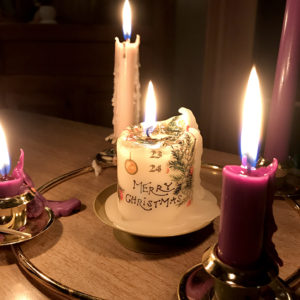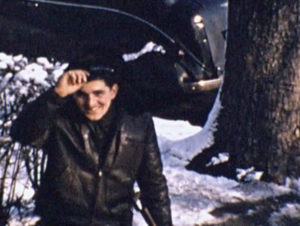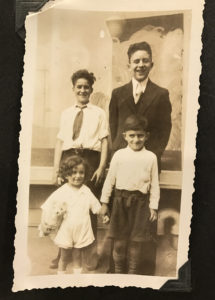So much hustle and hubbub for so long––weeks, months––and then Christmas Eve comes and with it, a wash of calm. It is the calm of reality: what is not yet done is probably not going to get done, and there is a certain beauty to that. We accept our humanity and the fact that we are not perfect and we understand that all is well, no matter what is done or not done. Once again, it is Christmas.
Beyond Christmas Eve and Christmas Day are the twelve days of the year that complete Christmastide. They are days that stand traditionally outside ordinary time; six days in the old year, six days in the new. Here in this house, we know these as days filled with music and warmth, days when we can make our Christmas greetings and send them out to the world, days when we can bake once-a-year treats, days when we can read books and watch Christmas movies, days that evolve into nights when we can celebrate with mulled wine and roasted chestnuts and visit with family and friends. They are days that help me appreciate all we have, days when we count our blessings, and know that they are abundant.
The books I’ll be reading are most likely going to be old and most likely about Christmas. There is a long tradition of the Christmas ghost story––think of Charles Dickens and his Christmas Carol and all the spirits that appear in that tale. My mom and sister confided in Seth and me just tonight, in slow, hushed voices, that our great niece Joy––my sister’s little 3-year old granddaughter and my mom’s great-granddaughter––was in my old room at my family’s home with her mom just the other day and quietly announced to her mom that, “Oh, there’s Pop.” Pop, her name for my dad, her buddy. She loved him something crazy and if she can see him looking after her, well, who are we to discredit what she sees? Kids seem to be better connected to possibilities than adults. The ancient Celts thought of all these spokes in the wheel of the year––Midwinter the one we’re at now––as times when the bridge between the physical world and the spiritual world was more easily crossed.
I like to think of myself as open to these things, and so the story did not surprise me, but rather made me smile. I’ve felt Dad’s presence myself, and if he’s watching over me, certainly he’s watching over his little great-granddaughter, too. And certainly at Christmastime. It is part of the magic of this night and of this season. The nights are at their longest and darkest. The lights we illuminate, candles and electric bulbs alike, pierce the darkness, call down the light. The music and foods, carried down through the centuries, connect us to the past and the future. The stories, especially that of the child born in a barn amongst the animals on a cold winter’s night, are bridges, as well. We gather those we love and pull them close, as close as we can. We laugh, we cry, we sing, we pray. We bask in the glowing radiance of the light piercing the powerful darkness. If we allow the spirit to carry us, nothing, when we get right down to it, feels like these days feel. I’ll be with you, if I can muster the energy each day (and I think I can), through all Twelve Days of Christmas, writing about each of them. “You’ll be visited by three spirits,” Jacob Marley’s ghost tells Ebenezer Scrooge, but I guess in my version of the story, you’ll be visited by twelve. I pray you’ll make me welcome, much like Father Christmas himself, who comes each year, welcome or welcome not. But for now, to all of you: A very merry Christmas.
The advent candles are almost burnt down. On Sunday morning, we light three purple candles and one rose. By evening, though, it will already be Christmas Eve. And our daily advent candle, burning for a few hours each night, is ready soon to announce Christmas’ arrival.


